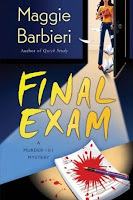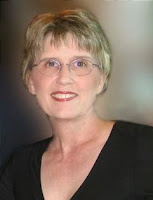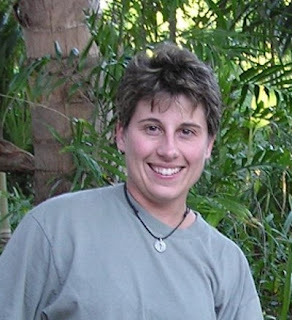An Excerpt from “Final Exam” (Murder 101 series)
“You’re not even in the door,” he said. “Let’s go in and see what else you need before I go to the store.”
“Besides a blow torch to burn this place down?” I asked, sitting dejectedly on the bed. A puff of dust flew up around me and I shivered in revulsion.
“Is there a laundry area in this building?” he asked, pulling me up off the bed and placing me in the doorway between the bedroom and living room. He pulled the bedding off and threw it onto the floor. “I don’t want you sleeping on Wayne Brookwell’s dirty sheets,” he said.
“That’s Wayne Butthole, to you.” I leaned on the door jamb. “Forever more, he’s Wayne Butthole.” I crossed my arms, and continued my visual reconnaissance of the area. “I hate him.”
“Laundry?” Crawford repeated.
“No idea,” I said. “I assume it’s in the basement but I can’t be sure.” Although I had parked outside of this building for the better part of a decade, I had never been inside, save for the lobby. The building was five stories high, with men housed on all but one floor, a floor that had been reserved for the overflow of female students in any given year. But Siena was still known as the men’s dorm and had been since I had been a student here, years previous. It looked pretty much the same as I remembered it—ornate, varnished mouldings; marble floors; heavy mahogany doors stained a dark, cherry brown. It smelled of Pledge and floor polish and decades’ worth of smelly gym socks and young adult hormones.
Crawford picked the pile of dirty bedding up and started down the hall, his sneakers making a squish-squish noise as he proceeded. I back went into the bedroom and sat down on the denuded bed, surveying my surroundings. I couldn’t imagine spending one night here, never mind five weeks, but that was my lot and I had to suck it up. I don’t want to suck it up! I wanted to yell, but I made an attempt at maturity and swallowed whatever feelings I had. The one thing I couldn’t ignore was my bladder, which obviously was past the point of no return. I got up and went into the bathroom, looking around as I did my business, taking in the rust stains in the porcelain pedestal sink, and the dirty ring around the tub. There were a few squares of toilet paper left on the roll and I made a mental note to tell Crawford to get toilet paper, too.
When I flushed the toilet, a torrent of water, toilet paper, and various other bits of flotsam and jetsam that had been residing in the toilet since the Mesozoic Age came spewing up at me from the filthy bowl, and I put my hands over my face to protect myself, a little too late. The front of my shirt and my jeans were instantly soaked, and water poured onto the tile floor and puddle around my feet. I spit a few times, wondering exactly what I had almost ingested. I grabbed a less-than-clean towel from the towel bar and wiped off my face and hands. I looked at the floating detritus on the floor and stifled a gag.
Crawford returned and knocked softly on the bathroom door. “Everything okay in there?”
“No!” I called back while attempting to open the door with the ancient door knob. I finally got it open and gave him a view of what the bathroom looked like.
“What the hell happened?”
“What do you think happened?” I asked and threw the soaked towel at him, catching him squarely in the solar plexus. “We are not off to a good start here.”
He went into the bathroom and threw the towel on the floor, attempting to sop up the mess from the exploding toilet. I riffled through my suitcase, finding a clean pair of jeans and a tee shirt. I stripped off my clothes and put them in a pile by the door. Once I was redressed, I stopped by the bathroom. “I’m going to go down to the laundry room and throw these clothes in, too.” I watched as Crawford raised the toilet seat and stared solemnly into the toilet. I had no idea whether or not he was handy and I wasn’t sticking around to find out. “It’s in the basement, right?”
He didn’t turn around but put his hands on his hips, surveying the damage. “Right.”
I padded down the hall toward the grand staircase which led me to a laundry room that was much nicer than my new accommodations. Six new, state-of-the-art washers and companion dryers lined one wall, the other wall lined with vending machines with soda, candy, and snacks. There was a change machine, and a machine to buy bleach and detergent. It was clean, well-lit, and modern with signs advertising its wi-fi access. I looked around enviously. My basement was musty, dusty, and home to more than one mouse, I suspected. Okay, so things were looking up. A little bit.
I threw the dirty clothes into the wash that Crawford had started and returned to the lobby floor, which was still empty. I had forgotten to ask Merrimack if any students were staying on campus during Spring Break and made a mental note to send him an email once I unearthed my computer from the mound of my possessions in the middle of the little patch of floor between my bed and the dresser.
“Do you want to get Chinese food, Crawford?” I asked, back upstairs and going through items in my open suitcase. He didn’t answer. I guess I owed him an apology for biting his head off and throwing the dirty towel at him but I didn’t expect the silent treatment. “Crawford?” I went to the bathroom door and found him kneeling on the floor in his undershirt, the toilet off its seal, the top removed. His shirt was draped over the side of the tub and he was dirty and wet, his dark hair flopping over his sweaty brow. “Crawford?”
He leaned over and stretched out, ending up on his right side, his left arm disappearing into the gaping hole of the upended toilet. He came out with a ziplock bag filled with something that I knew wasn’t Mrs. Brookwell’s famous home-grown tea.
He looked up at me. “Call Fred.”
Final Exam at Amazon







